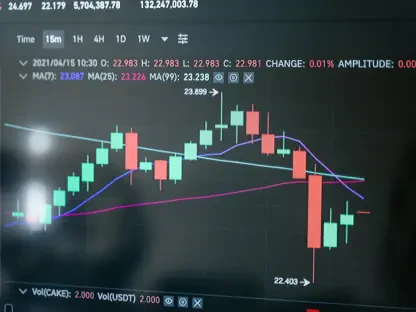The UK Fast Moving Consumer Goods (FMCG) market, a dynamic sector encompassing everyday essentials like food, beverages, personal care items, and household products, is undergoing a profound transformation driven by shifting consumer priorities and societal trends. With its hallmark of high turnover and widespread demand, this industry is adapting swiftly to meet new expectations, particularly around health and sustainability. Market projections indicate a remarkable growth trajectory, climbing from USD 569.5 million in 2024 to an estimated USD 1,292.2 million by 2035, fueled by a consistent annual growth rate of 7.73%. This surge reflects not just economic potential but also a deeper change in how consumers approach their daily purchases. As people increasingly prioritize wellness and environmental responsibility, companies are compelled to rethink their strategies, from product innovation to distribution models. This article explores the key forces shaping this evolution, delving into how health-conscious choices, sustainable practices, and digital advancements are redefining the landscape of FMCG in the UK.
Prioritizing Wellness in Consumer Choices
The shift toward health and wellness has become a defining characteristic of the UK FMCG market, moving beyond a mere trend to a fundamental expectation among shoppers. Consumers are more discerning than ever, closely examining product labels to ensure they align with personal well-being goals, whether that means fewer artificial additives, reduced sugar content, or more natural ingredients. This growing awareness has spurred companies to innovate across their portfolios, developing offerings that cater to a variety of dietary preferences and lifestyle needs. From plant-based alternatives to low-fat options, the diversity in product ranges ensures broader appeal and captures a wider audience. This focus on health not only drives sales but also fosters deeper connections with customers who value brands that prioritize their physical well-being over mere convenience or cost.
Beyond individual product choices, there’s a noticeable cultural shift toward viewing health as a holistic priority within society. FMCG brands are responding by reformulating recipes to meet nutritional demands while emphasizing transparency about ingredients and production methods. This openness is critical, as today’s consumers often base their trust on how clearly a company communicates its commitment to healthier options. Marketing campaigns now frequently highlight wellness benefits, reinforcing the message that choosing certain products contributes to a better quality of life. This alignment with societal values has proven to be a significant growth driver, as companies that successfully integrate health-focused strategies into their core operations tend to see stronger customer loyalty and sustained market share in an increasingly competitive environment.
Sustainability as a Core Business Strategy
Sustainability has emerged as a non-negotiable priority in the UK FMCG sector, with consumers and regulators alike pushing for greater environmental accountability. Shoppers are increasingly vocal about their expectations for brands to minimize ecological harm, whether through recyclable packaging, reduced plastic use, or lower carbon emissions. This demand is amplified by government initiatives promoting a circular economy, which encourage businesses to rethink traditional production and disposal methods. Companies face mounting pressure to adopt practices that not only comply with regulations but also resonate with an audience that views environmental responsibility as a key purchasing factor. As a result, sustainability is no longer a peripheral concern but a central pillar of strategic planning for forward-thinking firms in this space.
In response to these expectations, many FMCG players are taking bold steps to integrate eco-friendly practices into their operations, from sourcing raw materials ethically to redesigning packaging with upcycled or biodegradable materials. These efforts extend to optimizing supply chains to cut down on waste and energy consumption, demonstrating a commitment to reducing overall environmental impact. Such initiatives serve a dual purpose: meeting regulatory standards and building trust with a consumer base that increasingly equates ethical practices with brand credibility. Firms that position themselves as leaders in sustainability often gain a competitive advantage, as their proactive stance on environmental issues sets them apart in a crowded marketplace. This trend underscores the reality that sustainable innovation is not just a moral imperative but a critical component of long-term business success.
Digital Innovation Reshaping Market Dynamics
The digital revolution, particularly the explosive growth of e-commerce, is fundamentally altering how FMCG products are distributed and consumed in the UK. The surge in online shopping, initially accelerated by global events, has solidified into a permanent behavior for many, prompting brands and retailers to prioritize robust digital platforms. Investments in logistics, same-day delivery, and user-friendly interfaces have become essential to meet consumer expectations for speed and convenience. Additionally, technologies like data analytics and artificial intelligence are being harnessed to offer personalized shopping experiences, tailoring recommendations to individual preferences. This shift is most pronounced in urban centers, where infrastructure supports rapid delivery, though it reveals disparities in access for more remote areas that still require innovative solutions.
Equally significant is the way digital tools are enhancing customer engagement within the FMCG sector, creating stronger bonds between brands and their audiences. Subscription models for household and personal care items, alongside targeted promotions driven by consumer data, are proving effective in fostering repeat purchases and building loyalty. Social media platforms also play a vital role, allowing companies to communicate directly with shoppers, gather feedback, and adapt quickly to changing demands. However, challenges remain in ensuring that digital strategies are inclusive, particularly for regions with limited technological access or slower delivery capabilities. Addressing these gaps through creative approaches, such as partnerships with local retailers or mobile-first solutions, could unlock further growth. The integration of digital innovation is clearly a cornerstone of the market’s evolution, reshaping not just sales channels but the very nature of consumer relationships.
Future Pathways for Growth and Adaptation
Reflecting on the trajectory of the UK FMCG market, it’s evident that the industry has navigated significant shifts in consumer behavior over recent years, with health and sustainability emerging as dominant themes. Companies have adapted by reformulating products to meet wellness demands, overhauling packaging to align with eco-friendly standards, and embracing digital platforms to enhance accessibility. These responses were not merely reactive but part of a broader recognition that meeting evolving expectations is essential for maintaining relevance and competitiveness in a fast-paced sector.
Looking ahead, the path to sustained growth lies in continued innovation and strategic foresight. FMCG brands should deepen investments in health-focused product development, exploring new categories that address diverse nutritional needs. Simultaneously, advancing sustainability through scalable solutions, such as carbon-neutral production or smart packaging, will be crucial in meeting both consumer and regulatory demands. Expanding digital reach, particularly into underserved regions, offers another avenue for growth, ensuring inclusivity in access to modern conveniences. By balancing these priorities with operational efficiency, the sector can build on past adaptations to secure a resilient and thriving future.









